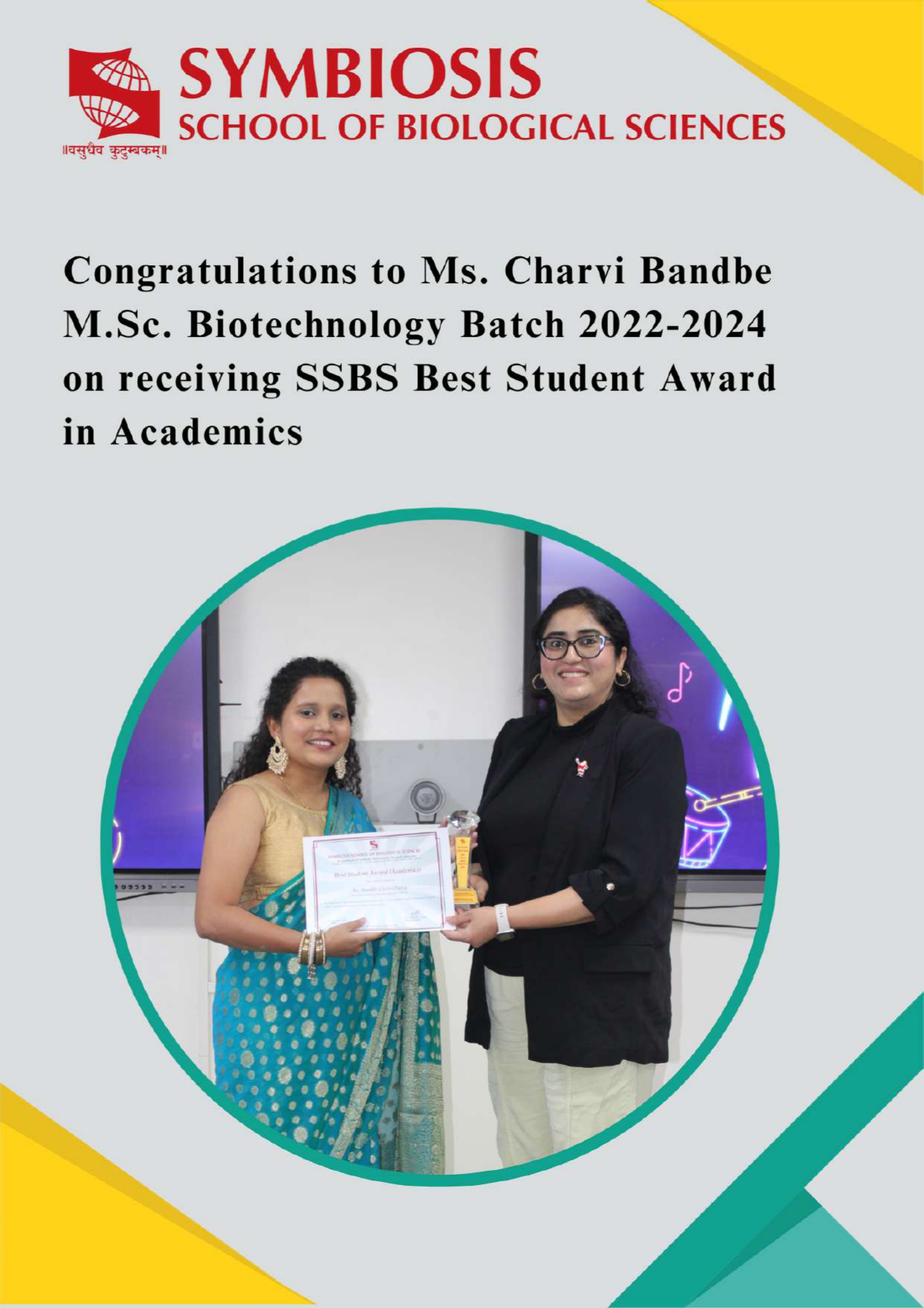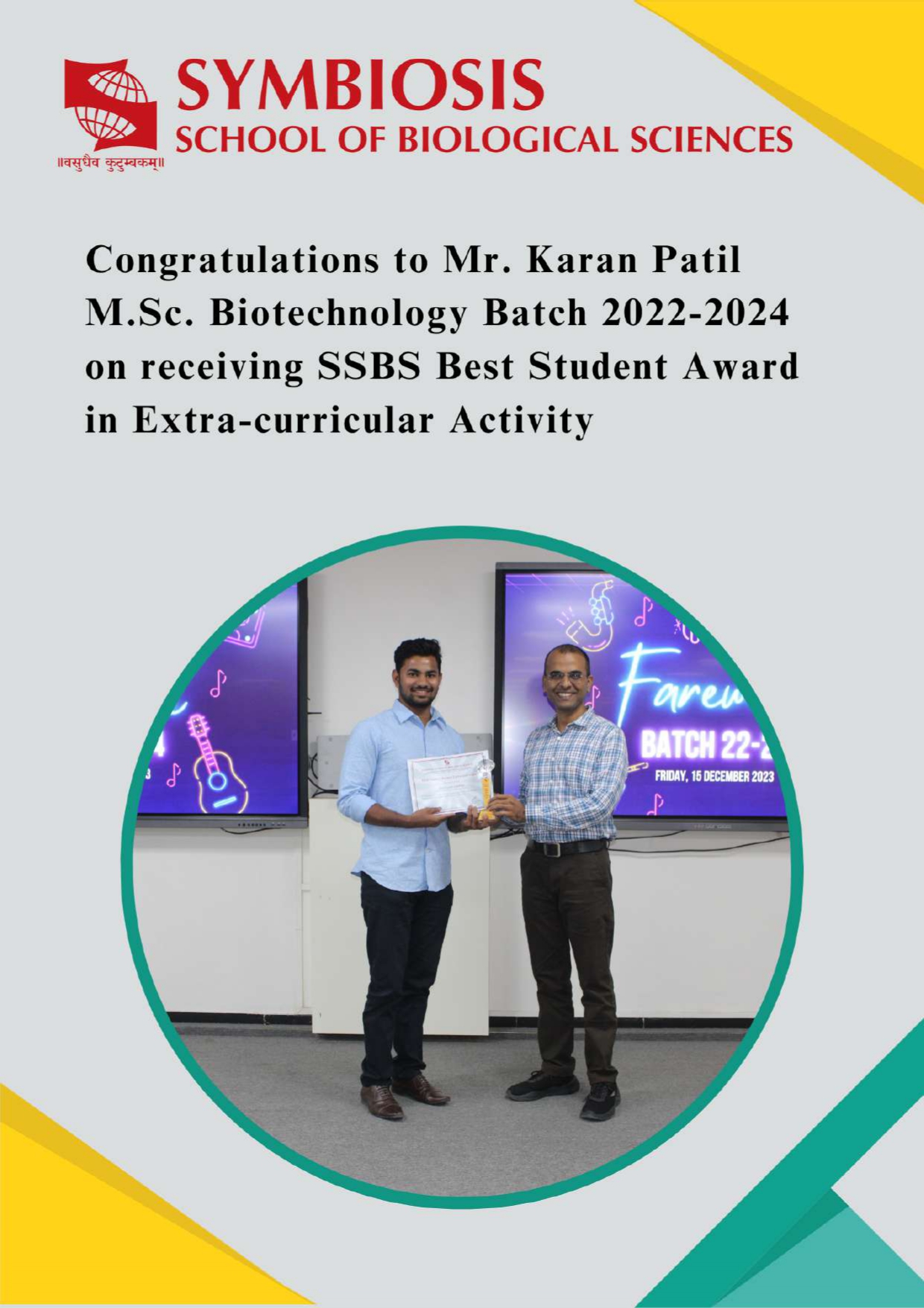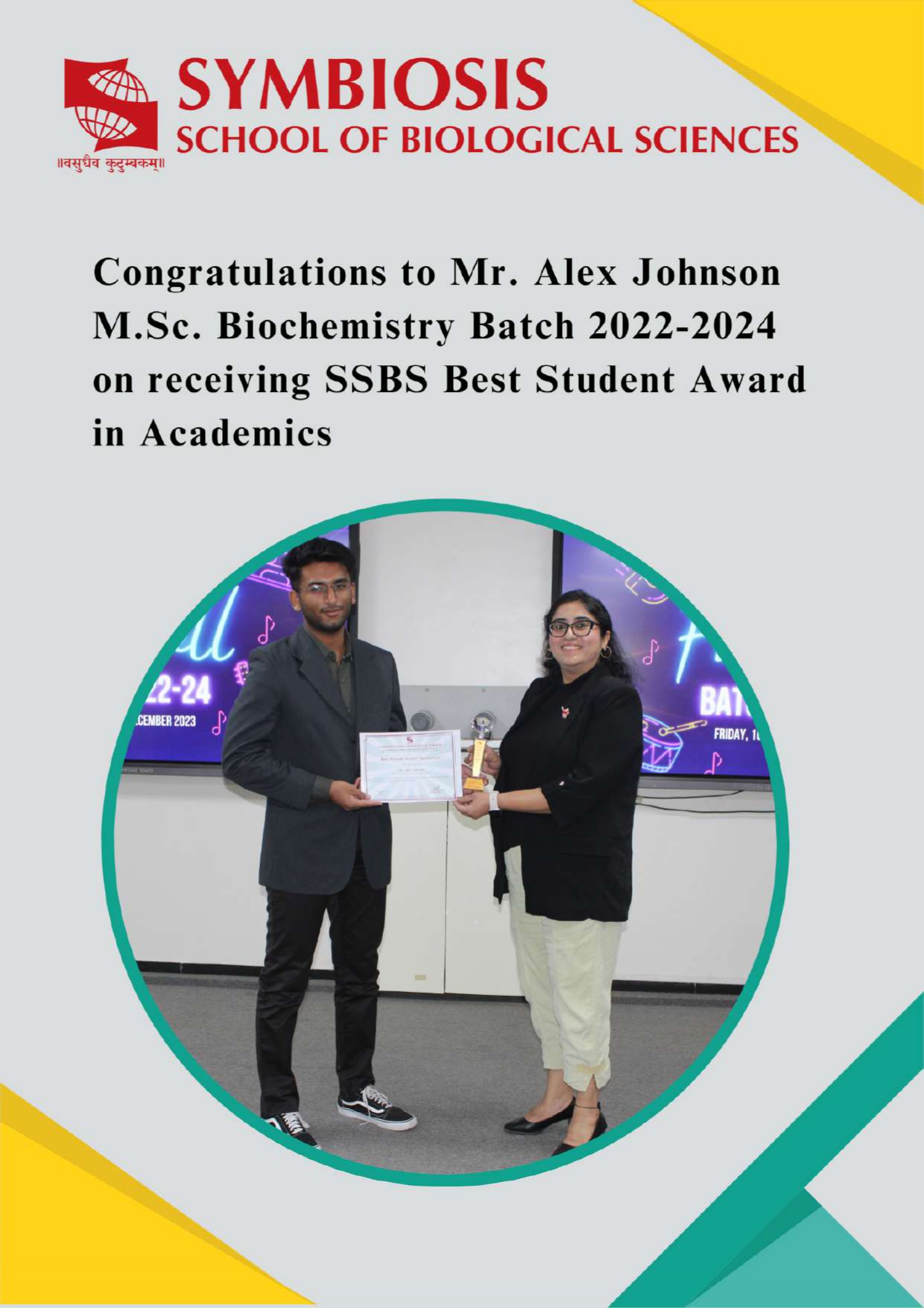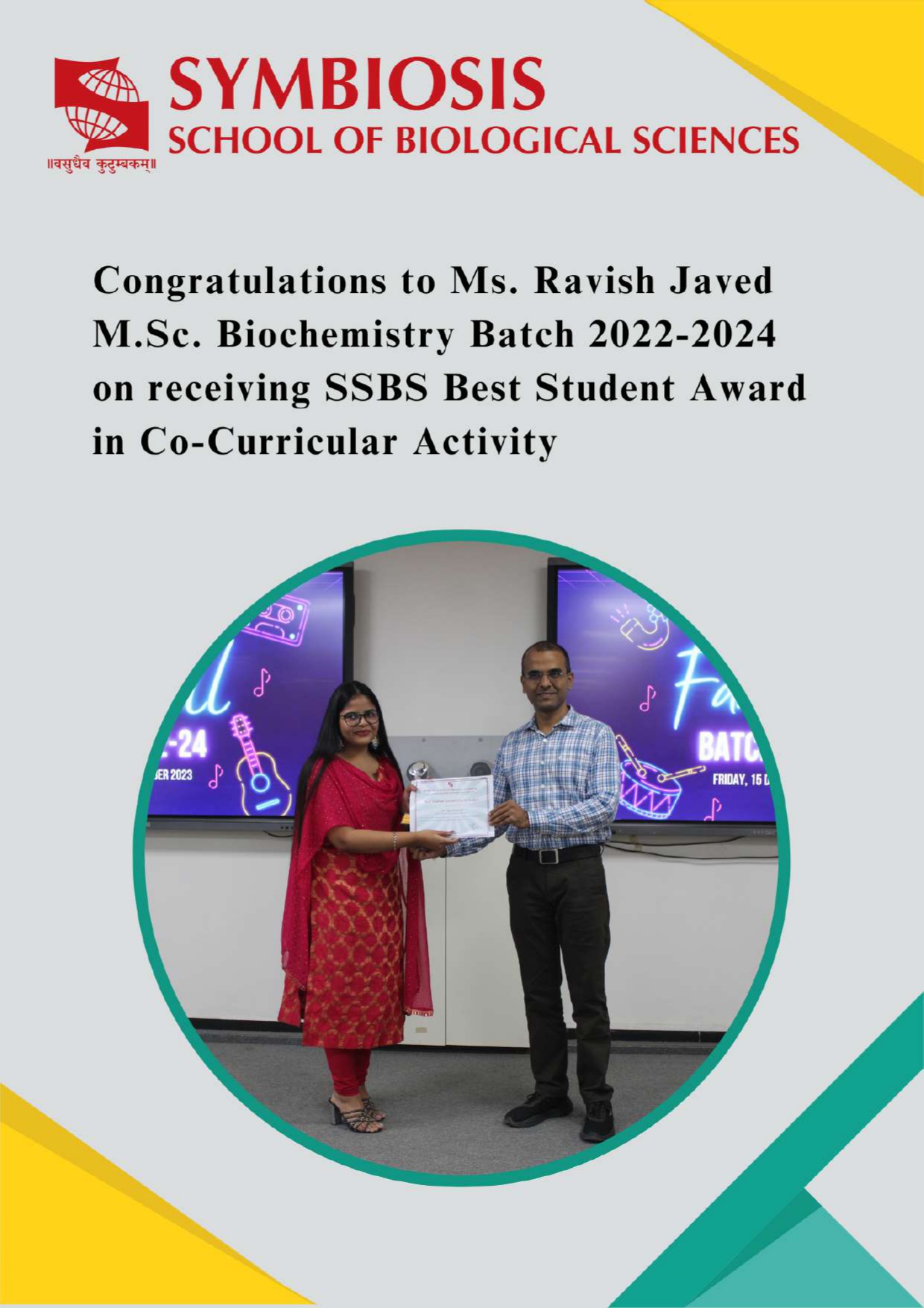Congratulations, Ms. Anushka Pawar, M.Sc. Biotechnology, Batch 2022-2024 for securing placement at Novagen Healthcare Pvt. Ltd. Vadodara, Gujrat for the position of Executive QC.
Congratulations, Ms. Divisha Bhardwaj, M.Sc. Biotechnology, Batch 2022-2024 for securing placement at Meril Life Sciences, Vapi, Gujarat for the position of Officer - CDM in the Project Management Department.
Congratulations, Ms. Divyani Singh, M.Sc. Biotechnology, Batch 2023-2025 for placed Beckman Coulter India Private Limited, Mumbai for the position of Campus Trainee – Application Specialist.
The second Alumni Talk took place on April 07, 2025, featuring Ms. Poushali Bhattacharya, she is working with research NGO as a Grants Specialist. Ms. Poushali Bhattacharya, an alumna from the M.Sc. Biotechnology batch of 2015--2017,
Congratulations, Ms. Charivi Bandbe (M.Sc. Biotechnology, Batch 2022-2024) for qualifying GATE – 2025 Exam in Life Sciences & Biotechnology.
Congratulations, Ms. Ruchi Kadam (M.Sc. Biotechnology, Batch 2022-2024) for qualifying GATE – 2025 Exam in Biotechnology
Read moreCongratulations, Ms. Pratiksha Pisar (M.Sc. Biochemistry, Batch 2022-2024) for qualifying GATE – 2025 Exam in Biotechnology
Congratulations, Ms. Ravish Javed (M.Sc. Biochemistry, Batch 2022-2024) for qualifying GATE – 2025 Exam in Biotechnology
Congratulations, Mr. Mukul Angal (M.Sc. Biotechnology, Batch 2022-2024) for qualifying GATE – 2025 Exam in Life Sciences.
Congratulations, Ms. Pranisha Donge (M.Sc. Biotechnology, Batch 2023-2025) for qualifying GATE – 2025 Exam in Life Sciences & Biotechnology.
Congratulations, Ms. Shriya Joshi (M.Sc., Biotechnology, Batch 2023-2025) for qualifying GATE – 2025 Exam in Biotechnology.
Congratulations, Ms. Mayura Apte (M.Sc, Biotechnology, Batch 2019-2021) for qualifying MH SET - 2024 Exam Life Sciences.
Congratulations, Ms. Pooja Shahane (M.Sc. Biotechnology Batch 2022-2024) for qualifying MH SET – 2024 Exam in Life Sciences & GATE – 2024 Exam in Biotechnology.
Congratulations, Mr. Monty Vijayvarigiya (M.Sc. Biotechnology, Batch 2021-2023) for qualifying Biotechnology eligibility Test (BET) – JRF – 2024.
Read moreCongratulation, Mr. Nishant Asawadekar, (M.Sc. Biotechnology, Batch 2020-2022) for qualifying GATE – 2024 Exam (Biotechnology).
Congratulations, Ms. Charvi Bandbe, M.Sc. Biotechnology, Batch 2022-2024 for placed Symbiosis School of Biological Sciences (SSBS), Pune for the position of Junior Research Fellow.
Congratulations, Ms. Arti Londhe, M.Sc. Biotechnology, Batch 2022-2024 for placed Symbiosis School of Biological Sciences (SSBS), Pune for the position of Project Assistant.
Read moreCongratulations, Ms. Deepali Patodkar, M.Sc. Biotechnology, Batch 2022-2024 for placed at Symbiosis School of Biological Sciences (SSBS), Pune for the position of Project Assistant.
Congratulations, Ms. Imaan Haque, M.Sc. Biotechnology, Batch 2022-2024 for placed at Symbiosis School of Biological Sciences (SSBS), Pune for the position of Junior Research Fellow.
Congratulations, Ms. Bhavana Yemulkar, M.Sc. Biochemistry, Batch 2022-2024 for placed at Vaccine Research & Development, Kondhapuri, for the position of Trainee Vaccine R & D, Venkys India Limited, Pune
Congratulations, Ms. Namrata Raghavan M.Sc. Biotechnology, Batch 2022-2024 for placed at Vaccine Research & Development, Kondhapuri, for the position of Trainee Vaccine R & D, Venkys India Limited, Pune
Congratulations, Ms. Janhavi Patil M.Sc. Biotechnology Batch 2022-2024 for placed at ChromoXpert Research and Diagnostics Pvt. Ltd. for the position of Molecular Biology Technician, Mumbai.
Congratulations, Ms. Sakshi Shinde M.Sc. Biotechnology Batch 2021-2023 for Placed at Jain Irrigation System Ltd.
Congratulations, Ms. Unnati Singhania M.Sc. Biotechnology Batch 2021-2023 for Placed at Symbiosis School of Biological Sciences (SSBS) for the position of Research Associate, Pune
The Third Alumni Talk took place on October 01, 2024, featuring Mr. Rahul Vats, the founder of Amala Life—India's leading brand of 100% natural, plant-based supplements that integrate Ayurvedic principles with modern nutrition science. Mr. Vats, an alumna from the M.Sc. Biotechnology batch of 2020-2022, shared his journey from pursuing a Master's in Biotechnology to founding his health and wellness start-up. During his talk, he discussed the diverse career paths available to life science graduates, emphasizing the importance of skills such as innovation, leadership, and adaptability. He also provided valuable insights on product development and entrepreneurship,
Read moreFor this activity, a hilly trail approximately 3 km long, located in front of Sunny’s World and on the side of Sus-Nanded Road, was chosen. Trekking begun (around 3:45 pm) after all the participants reported at the starting point (right in front of Sunny’s world main gate and animal research work.
The event engaged 29 attendees, including M. Sc. (Nutrition and Dietetics), M. Sc. (Biotechnology by Research stream), and Ph. D. scholars. Animal welfare, its importance, the basis of ethical guidelines, national laws, and statutory bodies with specific guidelines, facility layout and registration with CCSEA, animal care, and husbandry practices, maintaining various records, various experimental techniques, and handling & restraining of a laboratory animal, various drug administration routes, and sample collection methods in pre-clinical testing were all covered during the workshop. The workshop aimed to provide attendees with a comprehensive understanding of the ethical considerations and best practices in using laboratory animals for research. This knowledge would be valuable for their future life sciences and animal research work.
The event engaged 29 attendees, including M. Sc. (Nutrition and Dietetics), M. Sc. (Biotechnology by Research stream), and Ph. D. scholars. Animal welfare, its importance, the basis of ethical guidelines, national laws, and statutory bodies with specific guidelines, facility layout and registration with CCSEA, animal care, and husbandry practices, maintaining various records, various experimental techniques, and handling & restraining of a laboratory animal, various drug administration routes, and sample collection methods in pre-clinical testing were all covered during the workshop. The workshop aimed to provide attendees with a comprehensive understanding of the ethical considerations and best practices in using laboratory animals for research. This knowledge would be valuable for their future life sciences and animal research work.
The event engaged 29 attendees, including M. Sc. (Nutrition and Dietetics), M. Sc. (Biotechnology by Research stream), and Ph. D. scholars. Animal welfare, its importance, the basis of ethical guidelines, national laws, and statutory bodies with specific guidelines, facility layout and registration with CCSEA, animal care, and husbandry practices, maintaining various records, various experimental techniques, and handling & restraining of a laboratory animal, various drug administration routes, and sample collection methods in pre-clinical testing were all covered during the workshop. The workshop aimed to provide attendees with a comprehensive understanding of the ethical considerations and best practices in using laboratory animals for research. This knowledge would be valuable for their future life sciences and animal research work.
The event engaged 29 attendees, including M. Sc. (Nutrition and Dietetics), M. Sc. (Biotechnology by Research stream), and Ph. D. scholars. Animal welfare, its importance, the basis of ethical guidelines, national laws, and statutory bodies with specific guidelines, facility layout and registration with CCSEA, animal care, and husbandry practices, maintaining various records, various experimental techniques, and handling & restraining of a laboratory animal, various drug administration routes, and sample collection methods in pre-clinical testing were all covered during the workshop. The workshop aimed to provide attendees with a comprehensive understanding of the ethical considerations and best practices in using laboratory animals for research. This knowledge would be valuable for their future life sciences and animal research work.
The event engaged 29 attendees, including M. Sc. (Nutrition and Dietetics), M. Sc. (Biotechnology by Research stream), and Ph. D. scholars. Animal welfare, its importance, the basis of ethical guidelines, national laws, and statutory bodies with specific guidelines, facility layout and registration with CCSEA, animal care, and husbandry practices, maintaining various records, various experimental techniques, and handling & restraining of a laboratory animal, various drug administration routes, and sample collection methods in pre-clinical testing were all covered during the workshop. The workshop aimed to provide attendees with a comprehensive understanding of the ethical considerations and best practices in using laboratory animals for research. This knowledge would be valuable for their future life sciences and animal research work.
The event engaged 29 attendees, including M. Sc. (Nutrition and Dietetics), M. Sc. (Biotechnology by Research stream), and Ph. D. scholars. Animal welfare, its importance, the basis of ethical guidelines, national laws, and statutory bodies with specific guidelines, facility layout and registration with CCSEA, animal care, and husbandry practices, maintaining various records, various experimental techniques, and handling & restraining of a laboratory animal, various drug administration routes, and sample collection methods in pre-clinical testing were all covered during the workshop. The workshop aimed to provide attendees with a comprehensive understanding of the ethical considerations and best practices in using laboratory animals for research. This knowledge would be valuable for their future life sciences and animal research work.


























































.jpg)









.webp)
.webp)

















.webp)


.webp)
.webp)
.webp)
































